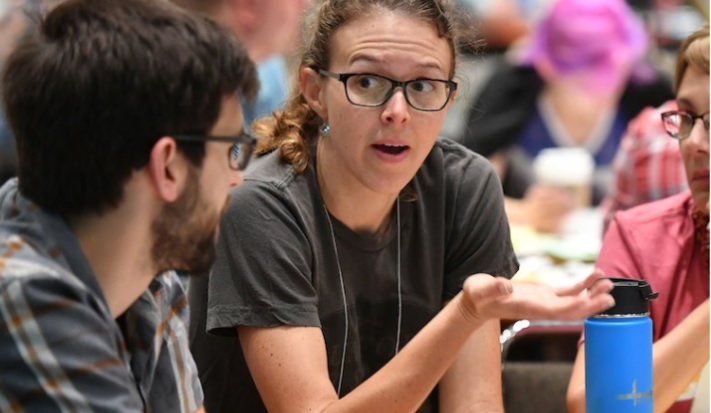
Young adults at the Future Church Summit in Orlando 2017. Photo by Kenneth Krehbiel.
by Jordan Waidelich for Mennonite Church USA
Tyler Eshleman is hopeful.
He’s not just hopeful because nearly 270 young adults attended this year’s convention, up from 75 in Kansas City. He’s hopeful because they enthusiastically joined in the conversation.
“It’s exciting to me because young adults are engaged and involved,” said Eshleman, the young adult coordinator for Mennonite Church USA, “whether that’s coming as a youth sponsor, Future Church Summit participant, delegate, co-presenter of a presentation or with an organization to help represent or advocate for a particular group.”
Young adults’ involvement did not go unnoticed.
“Over and over again, I heard other people and church leaders say they have so much hope after this week because of the number of young adults that were here and the presence they were having,” Eshleman said. “I think that’s really a hopeful thing, and it’s one of the reasons I continue to be optimistic about the direction our church is heading.”
Hannah Chappell-Dick, the other young adult coordinator for convention, is also hopeful.
“I would love to see young adults have more voice in the church at the national level because that’s how we create a vibrant and continuous church body,” she said. “My hope is that we can have some kind of permanent place for young adults at the table.”
Events for young adults were designed so people doubling as youth sponsors or Future Church Summit participants could attend. They included seminars on racism in the church, creation care and listening to survivors of sexual assault, among others.
Young adults chose these topics through a survey of their top concerns in the church. Then on Friday night, young adults and church leadership had an open discussion about those very issues.
The main themes that emerged from the discussion were creation care, diversity and addressing racism, LGBTQ inclusion, peacemaking and education, keeping young adults involved in the church and maintaining transparency throughout the church.
Young adults walked away from that conversation with a number of different visions for the church.
“I’d love to see more active engagement in leadership opportunities,” said Christina Hershey, a young adult from Mechanicsburg, Pennsylvania. “I also think having a platform to share ideas and actually being listened to is important.”
Many of the aspirations included making the church more welcoming.
“My hope is that young people continue to be inspired to push the rest of the church to remain open,” said Harrison Horst, a young adult from Lancaster, Pennsylvania. “I think that’s a good thing for our church.”
Andrea De Avila Balboa, a young adult from Winnipeg, Manitoba, is hopeful about the progress that can be made, but she wants to see the church start doing the things it talks about.
“I want to see the church take a lot more action in the things that we say relate to our faith,” Avila Balboa said, “and I think from these conversations, even though there are different areas, they all involved action.”
But while many young adults would like to see change happen immediately, Eshleman encourages a bit of patience and commitment to bridging the generational gap.
“A frustration with my own generation sometimes can be that we’re very quick to act,” Eshleman said. “We don’t always take the time to learn the history or build the relationships first.”
By creating more consistent young adult programming, Eshleman hopes to strike a balance between pushing for action and building those relationships. He wants young adults to see that “the church has our backs and the church is interested in letting us participate.”
“I hope that we can slow down enough to take those relationships seriously and to invest in them ourselves,” Eshleman said. “It’s not just about getting things done, but it’s about really being community and being church.”
As Chappell-Dick and Eshleman look to the future, they want to continue creating spaces for young adults in the church.
“We want to provide more clarity next year about what the purpose of these discussions are,” Chappell-Dick said. “We really want them to be interactive and preferably multigenerational so that young adults can feel connected. The more years we have this infrastructure of young adult activities forming, the better we’ll do that.”
They leave this convention feeling hopeful and encouraged.
“Church leadership is not just looking to young adults in some token, and young adults aren’t just sitting back and critiquing our leaders,” Eshleman said. “What we’re seeing is authentic connection and a mutual striving to understand one another and the visions and enthusiasm we all share for living into the Jesus way as followers of Christ.”
Read the full issue of the Orlando Squeeze here.

